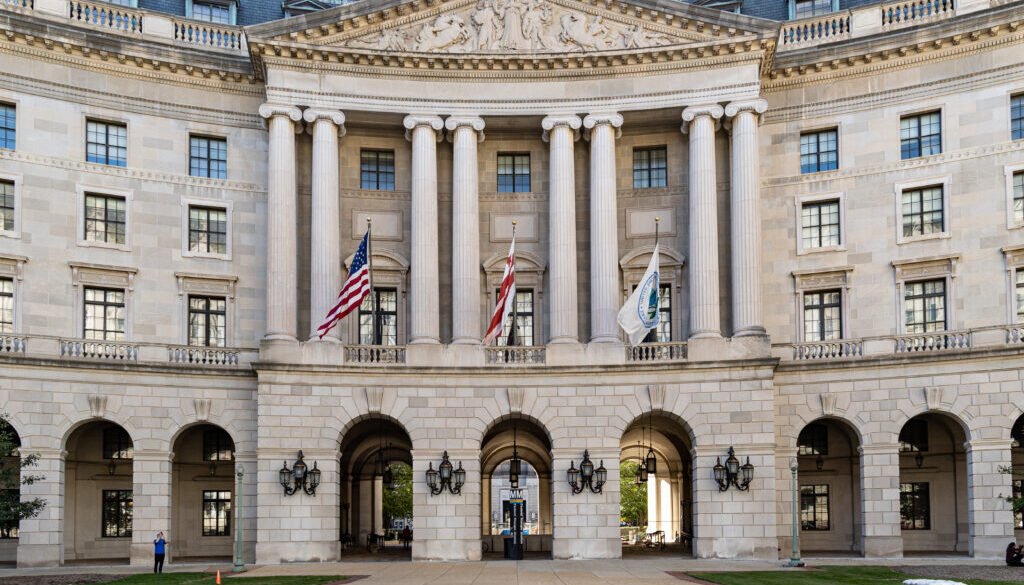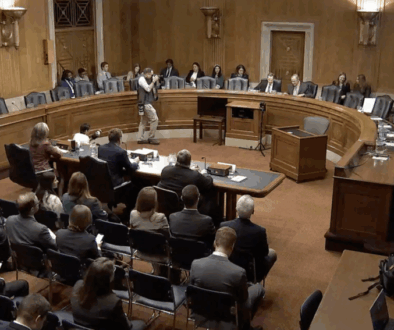Listen to the audio version of this article (generated by AI).
Top regulatory officials met with agricultural and chemical industry representatives dozens of times in the first few months after President Donald Trump took office in January, government records show — meetings that were followed by a series of regulatory rollbacks and a downplaying of pesticide concerns by the administration’s “Make America Healthy Again” (MAHA) Commission.
From February to mid-May, Environmental Protection Agency (EPA) leaders accepted meetings with representatives from at least 50 industry associations and companies, including agricultural and chemical giants such as Bayer, Corteva, BASF, Dow and the agrichemical lobbying group CropLife America, as well as the American Soybean Association, the National Cotton Council and others.
The meetings also included energy giants like ExxonMobil, Phillips 66, and companies working in plastics or chemical production such as Occidental Chemical Corporation. Some scheduled meetings involved representatives from multiple companies and their legal counsel or lobbyists.
Notably, the industry meetings involved former industry insiders who now are in top positions at the EPA: Nancy Beck, formerly an executive at the American Chemistry Council who is now the EPA’s principal deputy assistant administrator in the Office of Chemical Safety and Pollution Prevention, and Lynn Ann Dekleva, who previously worked at DuPont and as a lobbyist at the American Chemistry Council and is now the deputy assistant administrator of the same EPA office.
See the scheduled meetings here:
January and March Calendars
February Calendars
April Calendars
April (continued) and May Calendars
Beck worked in the first Trump administration’s EPA as well, leading efforts to remove or water down chemical regulations.
Beck’s meetings with agricultural interests included a March meeting regarding the pesticide dicamba with then-lobbyist Kyle Kunkler. In June, Kunkler joined the EPA to work alongside Dekleva and Beck.
The EPA records, obtained through a Freedom of Information Act request, show meetings with environmental and health groups were nearly absent from Beck and Dekleva’s calendars, other than meetings with the American Dental Association and the Physicians Committee for Responsible Medicine.
The records cover January through early May and only show invited attendees, not meeting minutes or issues discussed.
A MAHA makeover
Critics of the agrichemical industry said corporate influence in regulatory matters was underscored earlier this month when the Trump administration’s “Make America Healthy Again” (MAHA) Commission released its long-anticipated report on how to address chronic disease and clean up the food supply.
The final version was significantly more friendly to the agricultural industry than a May MAHA report that cited the health risks posed by the widely used farm chemicals glyphosate and atrazine. The September report took aim at synthetic dyes and junk food, among other things, but deleted references to glyphosate and atrazine and made no mention of pesticide exposure routes or risks.
Robert F. Kennedy Jr., Trump’s Secretary of Health and Human Services, has long railed against certain farm chemicals, calling them “poison,” but in a press conference discussing the September MAHA report, Kennedy evaded questions about the omission of pesticide dangers in the report.
Critics say the changes and omissions were seemingly in direct response to lobbying from major agricultural groups, as some sections in the report used policy language sought by CropLife.
Additionally, the May MAHA report blamed industry influence in the federal government for Americans’ high exposure to toxic chemicals, citing data that in 2023, about 60% of chemical-sector lobbyists had previously held federal posts.
However, the final report released this month eliminated language from the first report criticizing corporate influence over research, regulators and lawmakers as factors contributing to chronic health problems in the US.
The FOIA records show that on April 11, Beck was invited to attend weekly MAHA meetings, “to align on policy priorities and plans,” according to the meeting descriptions.
Agricultural organizations praised the September report and the MAHA Commission’s “vision,” welcoming the report’s “strong emphasis on aligning agriculture, nutrition, and environmental sustainability to promote a healthier future for America’s children.”
But environmental health advocates had the opposite view.
“When Croplife praises the report, we know something’s wrong,” said Emily Marquez, senior scientist with the Pesticide Action & Agroecology Network (PAN).
EPA defends meetings
Most companies did not respond to requests to comment about the meetings. A Bayer spokesman said in a statement that the company regularly meets with the EPA and other federal agencies as part of the regulatory process.
“Some of these meetings are required by law. Such interactions are not limited to registrant companies and many other groups including NGOs similarly interface with regulatory agencies,” Bayer said.
EPA spokeswoman Carolyn Holran said that questions about the number of meetings with industry groups and potential industry influence over policymaking were insulting to Beck and Dekleva.
“As EPA officials, Dr. Beck and Dr. Dekleva meet with a wide variety of stakeholders on issues within EPA’s Office of Chemical Safety and Pollution Prevention jurisdictions,” Holran said. “[They] remain committed to being led by the science and the law — unlike Biden EPA appointees with major ethical issues that were beholden to radical groups — as they work to Power the Great American Comeback.”
“As EPA officials, Dr. Beck and Dr. Dekleva meet with a wide variety of stakeholders on issues within EPA’s Office of Chemical Safety and Pollution Prevention jurisdictions.” – Carolyn Holran, EPA
The records show that on at least one occasion, Beck did skip a meeting with her former employer, the American Chemistry Council.
“I’m recused so will skip this one. Enjoy!” she wrote on March 14 to Travis Voyles, the EPA’s associate deputy administrator, who was meeting with Ryan Jackson, vice president of federal affairs with the council. That same day she had a meeting with the chemical company Balchem.
Tracey Woodruff, director of the Program on Reproductive Health and the Environment at the University of California, San Francisco, said she wasn’t surprised about Beck’s meeting schedule over the first few months. “We’re seeing unfettered industry access to all the decision-making around things like toxic chemicals and pesticides. It’s beyond anything we’ve already seen.”
In January, Woodruff and others affiliated with UCSF launched the Center to End Corporate Harm, to develop strategies to “counter the destructive influence of polluters and poisoners.”
While the calendars do not detail what was discussed in these meetings, since Trump took office, the EPA has rolled back multiple environmental regulations that industry has long railed against, including dropping drinking water limits on four types of per- and polyfluoroalkyl (PFAS), walking back a proposal to limit water pollution from meat and poultry plants, delaying stricter emissions rules at steel and coke plants, planning to eliminate its science research arm, rescinding the basis for greenhouse gas regulations, easing regulations on farmers using insecticides, among dozens of other planned rollbacks.
Featured image: The William Jefferson Clinton Federal Building, which houses the headquarters of the EPA. (Credit: Billy Wilson/flickr)



